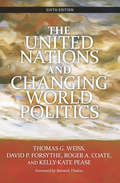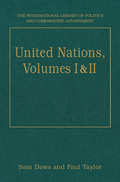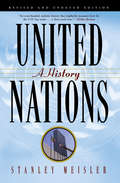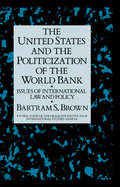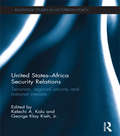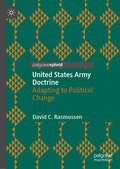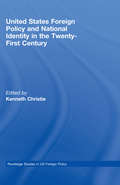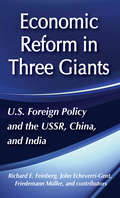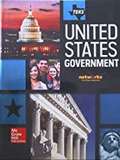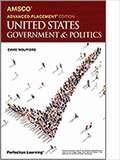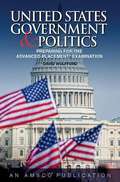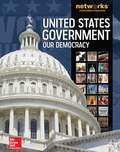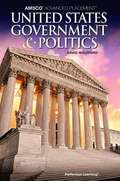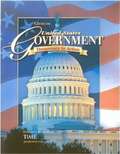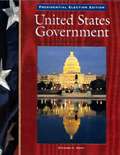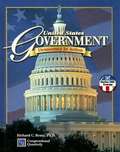- Table View
- List View
United Nations and Changing World Politics
by David P. Forsythe Thomas G. Weiss Roger A. Coate Kelly-Kate PeaseWith updates throughout, this newly revised sixth edition serves as the definitive text for courses on the United Nations. Built around three critical themes in international relations-international peace and security, human rights and humanitarian affairs, and building peace through sustainable development-The United Nations and Changing World Politics guides readers through the complexity of politics and history of the UN. Students of all levels will learn what the UN is, how it operates, and what its relationships are with external actors and institutions, from sovereign states to nongovernmental and intergovernmental organizations now playing important roles in world politics. Featuring a new chapter on evolving security operations and a new foreword by Ramesh Thakur, the sixth edition includes updated discussions of the UN’s actions in Darfur and Chad, the tenure of Ban Ki-moon, and the global economic and financial meltdown.
United Nations, Volumes I and II: Volume I: Systems and Structures Volume II: Functions and Futures (The International Library of Politics and Comparative Government)
by Paul Taylor Sam DawsThe International Library of Politics and Comparative Government is an essential reference series which compiles the most significant journal articles in comparative politics over the past 30 years. It makes readily accessible to teachers, researchers and students, an extensive range of essays which, together, provide an indispensable basis for understanding both the established conceptual terrain and the new ground being broken in the rapidly changing field of comparative political analysis. These two volumes include articles which examine the system, the structure, the function and the future of the United Nations.
United Nations: A History
by Stanley Meisler&“This is a definitive account of the United Nations for a general audience, told by a master.&” —Jim Hoagland, The Washington Post United Nations: A History begins with its creation in 1945. Although the organization was created to prevent war, many conflicts have arisen, ranging from the Korean War, to the Six-Day War, to genocide in Bosnia and Rwanda. Stanley Meisler&’s in-depth research examines the crises and many key political leaders. In this second edition, Meisler brings his popular history up to date with accounts of the power struggles of the last fifteen years, specifically spotlighting the terms of secretaries-general Boutros Boutros-Ghali, Kofi Annan, and Ban Ki-moon. This is an important, riveting, and impartial guide through the past and recent events of the sixty-five-year history of the United Nations. &“Balanced and insightful, this book is a must for anyone who wants to understand where the U.N. has been and, more importantly, how we might best use its potential for the future.&” —Thomas R. Pickering, former US ambassador to the UN
United States & The Politicizati
by BrownPublished in 1991, United States & The Politicizati is a valuable contribution to the field of International Politics.
United States - Africa Security Relations: Terrorism, Regional Security and National Interests (Routledge Studies in US Foreign Policy)
by Kelechi A. Kalu And George Klay Kieh Jr.United States-Africa relations have experienced four major cycles. The first cycle was during the Cold War(1960-1990). During this period, the U.S. developed a one-sided relationship with various African states in which the latter served as "foot soldiers" for the U.S. in its competition with the Soviet Union for global domination. Among other things, the various client African states provided the U.S. with access to airfields, deep water ports and sites for the establishment of various intelligence gathering facilities. In addition, the U.S. used various groups like UNITA led by Jonas Savimbi in Angola to undermine and fight pro-Soviet regimes on the continent. The second cycle of the relationship covered the period 1991-1998. During this time, the U.S. scaled down its security activities in Africa. The major reason was that with the end of the Cold War Africa(with few exceptions like Egypt) was no longer a major front for the promotion of U.S. Security interests. The third cycle commenced in 1998 and ended in 2001. This period was characterized by the U.S.’ search for an approach to frame its security relations with Africa. In this vein, the U.S. undertook various military-security initiatives . The fourth cycle began after the 9/11 terrorist attacks against the American homeland. Since then, the U.S. has expanded the scope of its security relations with Africa, as reflected in the establishment of various initiatives and programs. At the core is the prosecution of the American "war on terror." Against this backdrop, this book examines some of the major dimensions of the U.S.’ security relations with Africa, including American security interests on the continent, the "war on terror," AFRICOM, and military cooperation. Using the book’s integrative theoretical framework, each of the chapters in the volume examines the various factors that shape the issue of focus.
United States Army Doctrine: Adapting to Political Change
by David C. RasmussenThis book argues that the US Army has made four significant shifts in the content of its capstone operations doctrine along a spectrum of war since the end of WWII: 1) in 1954 it made a shift from a doctrine focused almost exclusively on mid-intensity conventional warfare to a doctrine that added significant emphasis to high-intensity nuclear warfare; 2) in 1962 it made an even greater shift in the opposite direction toward low-intensity unconventional warfare doctrine; 3) in 1976 it shifted back to an almost exclusive focus on mid-intensity conventional warfare content; 4) and this is where Army doctrine remained for 32 years until 2008, when it made a doctrinal shift back toward low-intensity unconventional warfare – five and seven years into the wars in Iraq and Afghanistan respectively. Closely tracking each of these shifts, the author zooms in on specific domestic, international and bureaucratic politics that had a direct impact on these shifts.
United States Citizenship Student Text (Living in the United States Series)
by Kristina M. SwannUNITED STATES CITIZENSHIP, a component of the Living in the United States series, is an abbreviated version of traditional basal programs, written on Reading Level 3.0 - 4.5. The low reading level; sophisticated page layout; and age-appropriate visuals make each Student Text and accompanying activities appealing to struggling readers. The standards-based programs are appropriate for on-level students, students with learning differences, and students and adults reading below grade level. STUDENT TEXT - The full-color, 48-page Student Text features six easy-to-read chapters. Students will be able to explain the freedoms and responsibilities of U.S. citizens. Specifically, students will learn about the cultural makeup of the United States; principles of democracy; rights guaranteed by the Constitution and the Bill of Rights, such as due process rights; laws and important figures of the civil rights movement; voter qualifications such as citizenship, residence, and age; and more.
United States Foreign Policy & National Identity in the 21st Century (Routledge Studies in US Foreign Policy)
by Kenneth ChristieExamines the complex relationship between United States foreign policy and American national identity as it has changed from the post-cold war period through the defining moment of 9/11 and into the 21st century. Starting with a discussion of notions of American identity in an historical sense, the contributors go on to examine the most central issues in US foreign policy and their impact on national identity including: the end of the Cold War, the rise of neo-conservatism, ideas of US Empire and the influence of the 'War on Terror'. The book sheds significant new light on the continuities and discontinuities in the relationship of US identity to foreign policy.
United States Foreign Policy and Economic Reform in Three Giants: The U.S.S.R., China and India
by Richard E. FeinbergThree of the largest and strategically most important nations in the world -the Soviet Union, China, and India - are currently in the throes of historic change. The reforms in the giants are transforming global economic and geopolitical relations. The United States must reexamine central tenets of its foreign policy if it is to seize the opportunities presented by these changes.This pathbreaking volume in the Overseas Development Council's series analyzes economic reform in the giants and its implications for U.S. foreign policy. Each of the giants is opening up its economy to foreign trade and investment. What consequences will this have for international trade? Each giant is attempting to catch up to global technological frontiers by absorbing foreign technologies: In what areas might cooperation enhance American interests, and in what areas must the U.S. protect its competitive and strategic assets? What role can key international economic institutions play to help integrate the giants into the international economy? The contributors suggest how U.S. foreign policy should anticipate these new circumstances in ways that enhance international cooperation and security.Contents: Overview: Economic Reform in the Giants and U.S. Policy, by Richard E. Feinberg, John Echeverri-Gent, and Friedemann Miiller; Economic Reform in the USSR, by Friedemann Miiller; Economic Reform in China, by Rensselaer W. Lee III; Economic Reform in India, by John Echeverri-Gent; The Politics of Economic Reform in the Giants, by John Echeverri-Gent, and Friedemann Miiller; Economic Reforms and International Trade, by Thomas Naylor; Technology Transfer to the Giants: Opportunities and Challenges, by Richard P. Suttmeier; and The Geopolitical Consequences of Reform in the Giants, by Elena Borisovna Arefieva.
United States Government
by Carol Sullivan Jane W. SmithWelcome to a study of United States government. You may be asking yourself, "Why do I need to know about the different branches that make up the U.S. government?" Part of being a responsible U.S. citizen involves learning about the country's government and understanding how it works.
United States Government
by Donald A. Ritchie Richard C. Remy Lena Morreale ScottFEATURING COAUTHORSHIP BY CONGRESSIONAL QUARTERLY Thanks to the partnership between Glencoe and Congressional Quarterly, this program provides a " behind-the-scenes" look at Washington never before available in any government program.
United States Government
by Donald A. Ritchie Richard C. Remy Lena Morreale Scott Megan L. HansonUnited States Government and History textbook.
United States Government (HMH Social Studies United States Government Series #Student Edition 2018)
by Houghton Mifflin Harcourt StaffThe U.S. Constitution outlines six fundamental principles that have guided American government for more than 200 years. The Framers of the Constitution established these six principles-popular sovereignty, limited government, separation of powers, checks and balances, judicial review, and federalism-as the basis of our national government.
United States Government And Politics: Preparing For The Advanced Placement Examination
by David WolffordA one-semester or one-year course, perfect for students preparing to take the AP United States Government and Politics Exam.
United States Government Our Democracy
by Donald A. Ritchie Richard C. RemyUnited States government textbook
United States Government and Politics, Second Edition
by David WolffordEquip your students to excel in the new AP course and on the exam.
United States Government, Democracy in Action
by Richard C. RemyThis book provides a "behind-the-scenes" look at Washington never before available.
United States Government: Democracy In Action
by Richard C. RemyUnited States Government: Presidential Election Edition
United States Government: Democracy in Action
by Richard C. RemyThis book provides a "behind-the-scenes" look at Washington never before available in any government program.
United States Government: Democracy in Action
by Richard C. RemyFEATURING COAUTHORSHIP BY CONGRESSIONAL QUARTERLY. Thanks to the partnership between Glencoe and Congressional Quarterly, this book provides a "behind-the-scenes" look at Washington never before available in any government program.
United States Government: Democracy in Action, Guided Reading Activities
by McGraw-Hill StaffThe United States Government: Democracy in Action Guided Reading Activities provides activities for students who would benefit from a review of the material. By focusing on key information and concepts, Guided Reading Activities help students to understand and make appropriate connections among the ideas and facts they encounter in the student text.
United States Government: Democracy in Action, Reading Essentials & Study Guide
by Glencoe Mcgraw-HillStudent Workbook. The Reading Essentials and Study Guide is designed to help you use recognized reading strategies to improve your reading-for-information skills.
